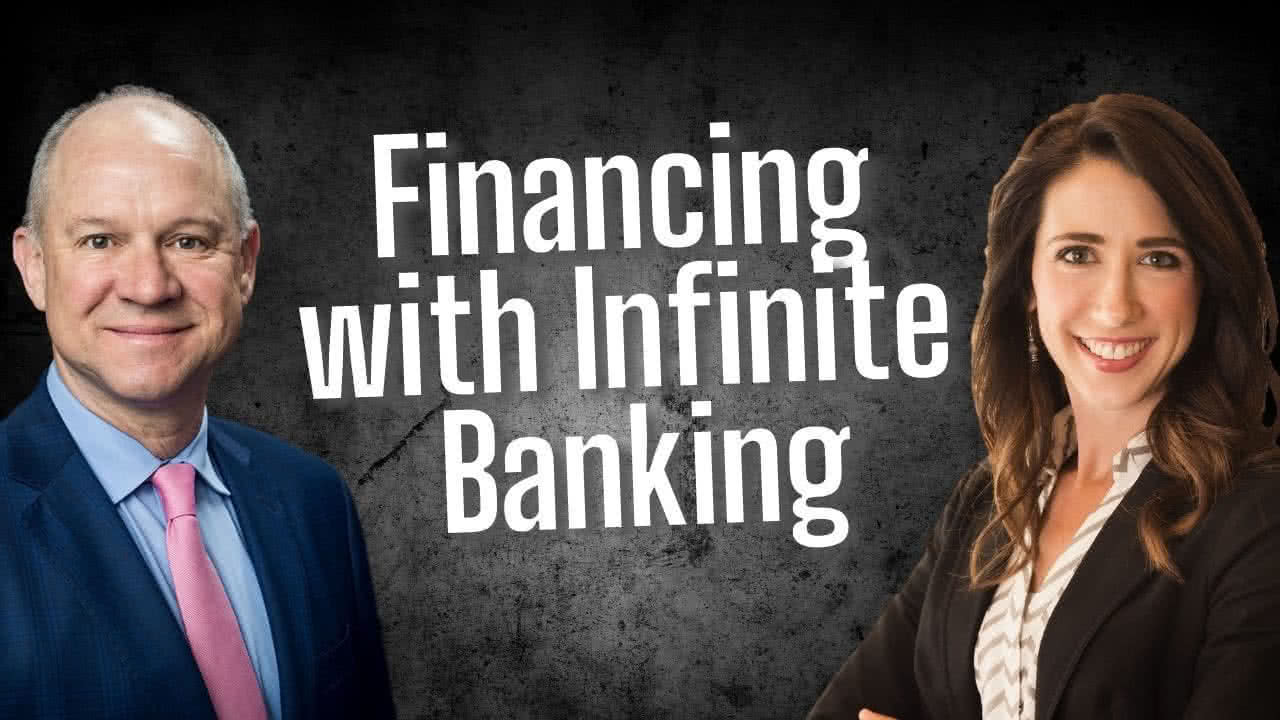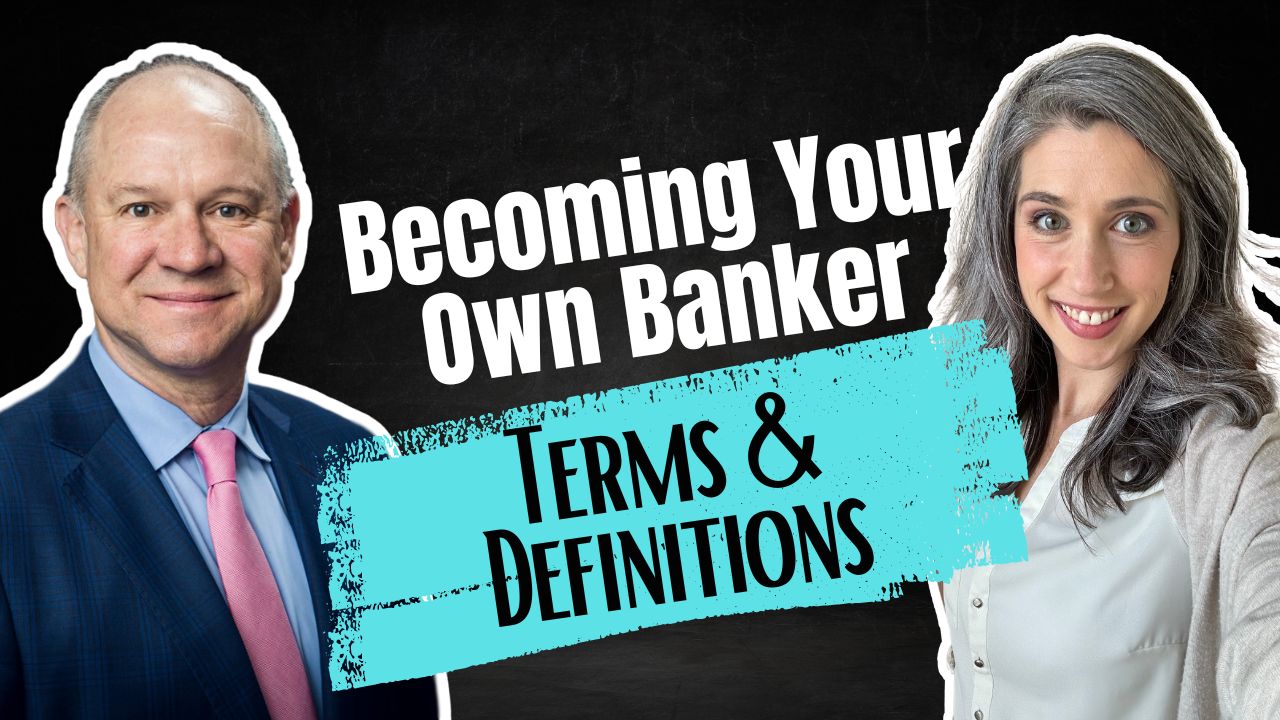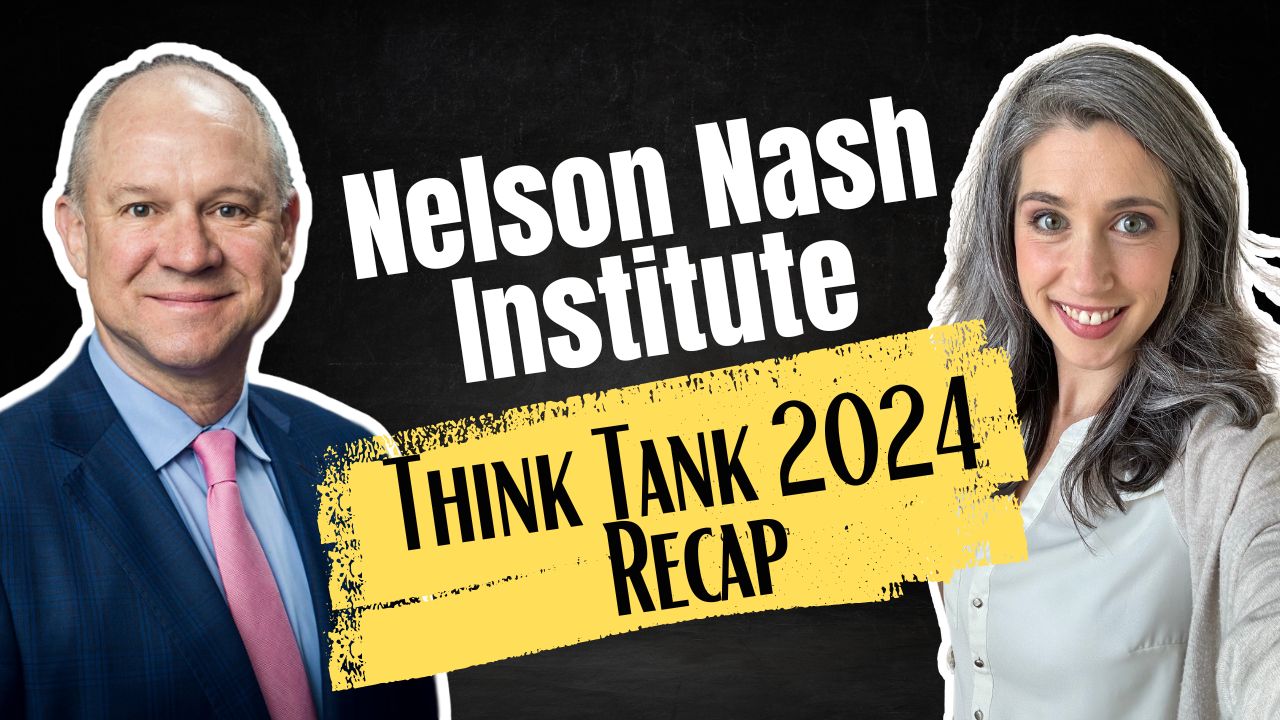
Financing with Infinite Banking
Why is financing with Infinite Banking better than paying cash?
Today, we’re answering a listener question about the Infinite Banking Concept. And we’re going back to Nelson Nash’s book, Becoming Your Own Banker to explain the concept.
So, if you want to better understand the Infinite Banking Concept and how it helps you make more effective financial choices that put you in control… tune in now!
Podcast: Play in new window | Download (Duration: 1:04:19 — 73.6MB)
Subscribe: Apple Podcasts | Spotify | Android | Pandora | RSS | More
Table of contents
Answering a Listener Question
We love to see what our community is saying, and answer any questions. Recently, we had an insightful question from a listener named Dave. Dave’s done the homework and read up on Infinite Banking. His question gets to the heart of the concept, so we wanted to dedicate some serious time to answering it.
Here’s Dave’s original question:
“…I do have a question regarding the chart and explanations on page 41 where Nelson Nash discusses the different ways to purchase a car. Methods A, B and C are very familiar to me, but method D and E are new concepts to me. It never occurred to me that I could purchase a car using the Bank C/D method, which shows to be superior to paying cash. Since this is the banking “concept,” but just using someone else’s bank I think it is important that I understand how this works and I am just not quite grasping it.
I think it would be helpful to me if you could explain and provide examples of how the Bank C/D method works and why is it more effective than paying cash. I can see from the chart that it is obviously better, but I just don’t totally understand why. Somewhere I am missing something in my understanding of this concept and I’m not learning it very well from the book. Maybe I am just not seeing the math the same way and it doesn’t seem to be explained very well in the book, at least to me.
If I store money in a bank and earn interest, but take out a loan from the bank to make a purchase isn’t it a wash? Where is the leverage and how does that benefit me? Is it because the interest rate on the C/D is higher than the borrowed interest rate? I know that you have recently been answering questions on your podcast and I hope you will find it worth your time to address this one. It seems to be at the center of how this concept works and once I understand that I think I may have a breakthrough in my understanding. Thanks for your time and effort.”
The Short Answer to Financing with Infinite Banking
Dave’s question is a great one that really addresses why someone would use infinite banking. We think, first of all, that what Nelson Nash did with his book is create options. There are different reasons, both personal and economic, to finance a car with each of his examples. However, leveraging a life insurance policy is often not considered among all the options. Primarily for the reasons that Dave brings up in his question–people aren’t familiar with it, and it can seem complicated.
The short answer is that using life insurance to fund a car allows you to take advantage of uninterrupted compounding. Because while you may pay interest on a loan, you’re also earning interest on the full value of your cash value. This means that you can both take advantage of capital without losing the momentum of your accumulation account’s ability to earn interest and grow.
[8:52] “Nelson used to always talk about this: It’s not about the rates of return… it’s about who’s controlling the banking function.”
The person who controls the banking function has the flexibility. While a principle of infinite banking is to be a good steward of your account and pay loans back diligently, a policy loan does have flexibility. With a bank loan, you cannot decide to lower your payment or skip your payment without a penalty. If you wish to do so with a policy loan, you can. Being the banker gives you power.
What Are the Options for Financing a Car?
We’d like to reiterate that the point of Becoming Your Own Banker is not to share the “only” way to do things. Instead, it reveals options and helps expose the pros and cons for each. For example, leasing a car can be the most expensive way to finance a car. And at the end of the lease, you don’t own the car. However, a lease can enable you to drive a car outside of your typical means. While we aren’t recommending this, it’s simply an option. The problem with leasing a car, however, is that there can often be a lot of unknown costs. Most leases, for example, have a mileage cap. Driving over that cap can incur expensive fees, which take many people by surprise.
Other than leasing a car, you can also finance a car through a bank loan, or you can pay in cash. These three methods of financing are all relatively straightforward, and each have pros and cons. In terms of pure cost, leasing is often more expensive, and you typically don’t own the car at the end of the transaction. A loan may be slightly less expensive in the long run, yet you’re still paying interest. Many people see cash as the most advantageous way to buy a car because it eliminates interest payments. Yet, it doesn’t eliminate the interest “cost.” Instead, you incur “opportunity cost,” because you lose the ability to use the lump sum of cash elsewhere, including an interest-earning account.
See: The Right Way to Spend Money: Spender, Saver, or Steward?
Why Use a CD?
In Becoming Your Own Banker, Nelson Nash mentions using a CD (Certificate of Deposit) from a bank as a way to finance a car. This is a similar option that allows you to accumulate money at a higher interest rate than a simple savings account. Once you’ve accumulated (which is necessary for both a CD or life insurance policy), you can utilize the cash stores.
This can be a more efficient way of buying a car than paying in cash. The reason is that not only have you built up capital with which you can borrow; you’ve also created a system of money that is earning a small percentage. If you withdraw enough from your CD to purchase your car, and then continue to buy CDs that earn an interest rate–enough to “catch up” to what you’ve taken–you can combat opportunity cost.
[22:22]“The person who chooses to capitalize a bank of their own by using a CD is at least doing the capitalization. They value putting capital aside and getting that to work for them and earning a return. [They’re] not just letting it sit in a bank account, barely earning anything.”
Why You Wouldn’t Want to Buy a Car With Cash?
If you have the cash to buy a car, why wouldn’t you just do that? This is one of the most common questions when talking about financing. After all, you can clearly see that paying cash eliminates all interest payments, right?
While many people may prefer to pay cash if they can, it’s not as efficient as many people think. This all comes down to “opportunity cost.” If you pay for a car in cash, you don’t have to pay interest, however, you also lose the opportunity to earn interest. In the right financial vehicle, this can make a huge difference.
The Math of Compounding
The more you accumulate, the better the compounding effect will be. If you liquidate your money in a typical savings account, you lose the ability to earn interest on that sum, and your money becomes less efficient. In the same way, paying for a car with cash can cause you to lose potential earnings. Not only does your cash lose future earnings potential—but the account you’ve drawn from also loses the momentum of compounding.
Dividend-paying whole life insurance policies, for example, can actually create a lot of opportunities for you. Let’s say that with dividends and interest, you earn about 5% on your account. Additionally, your premiums also contribute to your cash value. Every time your account increases, you’re earning on that new total. That’s the compounding effect.
The point is not just that you’re earning a rate of return with whole life insurance. The wider benefit is that your reserves are not disturbed, and yet you still have access to them. When you remove money from your savings account or CD, you are only earning interest on the remainder. With a policy loan, you continue to earn interest on the full amount of your assets, while also leveraging it for a purchase.
Is Financing with Infinite Banking “Paying Yourself Interest”?
[25”52] “To put this in layman’s terms, currently every insurance company except a few…are all hovering around five percent, because they base it upon the Moody Bond Index. The interest rate that you have to pay back to the insurance company. So Nelson would say, why not charge yourself eight percent, why not charge yourself ten percent?”
That additional three or five percent that you charge yourself is going into the PUAs. It’s not magic, it’s simply a way to encourage you to save more money, and accumulate more efficiently. It’s important to note that you are not paying yourself interest, though you may hear this from some people. You are simply paying into the PUAs, or paid-up additions, which are an optional portion of your whole life insurance. If you’re already maximizing your PUAs, there will be no room to make additional interest payments into your policy.
[29:50] “When you borrow from your cash value in a whole life insurance policy, there is an interest rate associated with paying back that loan. The interest rate, say it’s five percent, is not interest you pay to yourself, that’s the interest you pay to the insurance company for the use of their money.”
How is This Method Not a Wash?
To reiterate, David’s question raises the concern that if you are paying 5% to the insurance company just to earn 5%, isn’t that a wash?
Here’s where things get interesting. You can choose to make a payment of eight and a half percent on the loan, with five percent being paid to the insurance company. The remaining 3.5% gets applied to your PUAs, if you have not already maximized your PUAs in your policy design. This is an effective way to increase your cash reserves and save more efficiently.
This method is also not a wash simply because without interrupting your cash value to access capital, you’re leaving the full sum of money to earn interest and dividends. The percent you pay to the insurance company is only on the loan.
Even so, in a roundabout way, any time you pay the insurance company interest, you are growing their funds and profits, which benefits you as a policy owner. It is not the same as paying yourself interest, however.
What Insurance Has that Cash Alone Does Not
Whole life insurance has the added benefit of being life insurance. That means there’s a death benefit in place to protect your lifetime income so that you can leave something to your family and loved ones in the event of an emergency. We don’t know what the future holds, and tomorrow is not promised. Life insurance can create peace and eliminate some of the worries.
[40:!6] “The reality is…we are all going to die at some point. So can we prepare best for that moment and make sure that that moment, whenever it occurs in our lives, is the best possible financial transition for our family? That is in our power, and we do have the capability to make that decision today by using life insurance.”
[59:06] “Whenever you look at using infinite banking, we’re thinking of a long-term view. If you think just in terms of what’s best for you next month, you’re probably not going to choose infinite banking… If you think about what’s going to be best for you ten years from now, though, you’re really starting to move the needle on what is going to improve your financial future.”
Book A Strategy Call
Do you want to coordinate your finances so that everything works together to improve your life today, accelerate time and money freedom, and leave the greatest legacy? We can help! Book an Introductory Call with our team today at https://themoneyadvantage.com/calendar/ and find out how Privatized Banking, alternative investments, or cash flow strategies can help you accomplish your goals better and faster. That being said, if you want to find out more about how Privatized Banking gives you the most safety, liquidity, and growth… plus boosts your investment returns, and guarantees a legacy, go to https://privatizedbankingsecrets.com/freeguide to learn more.
Becoming Your Own Banker, Part 28: Infinite Banking Definitions
Have you ever felt like you’re on a financial hamster wheel, constantly spinning but never gaining traction? Join us as we unpack the epilogue and glossary of Nelson Nash’s “Becoming Your Own Banker.” It’s a journey through the intricate philosophy of IBC, as we cover Infinite Banking definitions that shows how effective money management can…
Read MoreNelson Nash’s Legacy: Think Tank 2024 Recap
Embark on a transformative financial odyssey with us as we reflect on our profound experiences at the Nelson Nash Think Tank for 2024. Unlock the doors to personal economic empowerment with the Infinite Banking Concept (IBC), a brainchild of the late Nelson Nash that revolutionizes the use of dividend-paying whole life insurance. We shed light…
Read More



Wonderful podcast! I liked the way you take the time to explain things fully. It shows both your compassion and your pool of knowledge. Now the place where you REALLY stood out is where you identified the downfall of disparaging options other than the one I, as an advisor have in my financial toolbelt. I work in Insurance primarily, that said I understand the benefits of an advisor for a suitable portfolio. The statement made, which in general suggested how the foolish undermining of so many political folks has moved over to so many people in the financial world. In short, “If I don’t sell it then it SUX! Such an attitude is a clear and obvious indicator of someone you do not want setting your course to financial success. Again, well done!
Thank you for listening to the podcast and glad you find the content valuable!